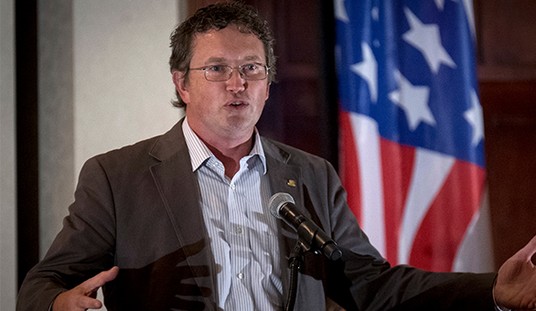In the introduction to his new book, The Revolt Against the Masses: How Liberalism Has Undermined the Middle Class, Fred Siegel of the Manhattan Institute writes:
The best short credo of liberalism came from the pen of the once canonical left-wing literary historian Vernon Parrington in the late 1920s. “Rid society of the dictatorship of the middle class,” Parrington insisted, referring to both democracy and capitalism, “and the artist and the scientist will erect in America a civilization that may become, what civilization was in earlier days, a thing to be respected.” Alienated from middle-class American life, liberalism drew on an idealized image of “organic” pre-modern folkways and rhapsodized about a future harmony that would reestablish the proper hierarchy of virtue in a post-bourgeois, post-democratic world.
Ninety years later, and as this self-mocking Salon article titled “Let’s nationalize Fox News” highlights, very little has changed amongst that portion of the left’s goals.
If you enjoyed Jonah Goldberg’s Liberal Fascism, James Piereson’s Camelot and the Cultural Revolution, and Daniel J. Flynn’s A Conservative History of the American Left, you will certainly enjoy Siegel’s new book. His early chapters chart the end of the early “Progressives” of the late 19th and early 20th century, such as Teddy Roosevelt, whom Tim Stanley of the London Telegraph describes today as a “Racist, imperialist, power-hungry megalomaniac,” and Woodrow Wilson, the man who was a big fan of the Klan (and vice versa). As Jonah noted in Liberal Fascism, Wilson’s brutal term in office during World War I (which Wilson had promised to keep America out of) has largely been airbrushed out of history — two guesses as to why. But it was during that period, Siegel writes, that “Progressives” stole a huge base from the laissez-faire conservative right, and began to describe themselves as “Liberal”:
In the standard accounts of American liberalism, both left and right argue that after the 1920s, Progressivism faced the Great Depression and as a result matured into the fully flowered liberalism of the New Deal. As I suggested in the previous chapter, this is fundamentally mistaken. While “winning the war abroad,” the Progressives “lost their war at home,” notes historian Michael McGerr. “Amid race riots, strikes, high inflation, and a frenzied Red Scare, Americans turned against the Progressive blueprint for the nation. The climax of Progressivism, World War I, was also its death knell.” Modern Republicanism — as incarnated in the 1920s by Presidents Harding, Coolidge, and Hoover — and modern liberalism were both reactions to the excesses of Progressivism. Modern liberalism was born of discontinuity, a rejection of Progressivism — a wrenching betrayal and a shift in sensibility so profound that it still resonates today. More precisely, the cultural tone of modern liberalism was, in significant measure, set by a political love affair gone horribly wrong between Woodrow Wilson and a liberal left unable to grapple with the realities of power politics. For Progressives, reformers, and Socialists, the years from 1918 through 1920 were traumatic. During the presidential election of 1916, many leftists had embraced Woodrow Wilson as a thaumaturgical leader of near messianic promise, but in the wake of repression at home and revolution and diplomatic disappointment abroad, he came to be seen as a Judas, and his numinous rhetoric was despised as mere mummery.
For the ardent Progressive Frederick Howe, who had been Wilson’s Commissioner of Immigration, the pre-war promise of the benign state built on reasoned reform had turned to ashes. “I hated,” he wrote, “the new state that had arisen” from the war. “I hated its brutalities, its ignorance, its unpatriotic patriotism that made profit from our sacrifices and used it to suppress criticism of its acts. . . . I wanted to protest against the destruction of my government, my democracy, my America.” As part of his protest, the thoroughly alienated Howe distanced himself from Progressivism. Liberals were those Progressives who had renamed themselves so as to repudiate Wilson. “The word liberalism,” wrote Walter Lippmann in 1919, “was introduced into the jargon of American politics by that group who were Progressives in 1912 and Wilson Democrats from 1916 to 1918.” The new liberalism was a decisive cultural break with Wilson and Progressivism. While the Progressives had been inspired by a faith in democratic reforms as a salve for the wounds of both industrial civilization and power politics, liberals saw the American democratic ethos as a danger to freedom at home and abroad.
I interviewed Siegel for PJM’s old Sirius-XM radio show back in 2009, when he had just published a tremendous piece for City Journal on H.G. Wells, “The Godfather of American Liberalism,” material from which is incorporated into Revolt Against the Masses. Take a listen:
[audio:https://pjmedia.com/eddriscoll/user-content/24/files/2014/01/2009_fred_siegel_hg_wells_1-19-14-1.mp3](Ten minutes long, 9.09 MB file size. Click here to download MP3 file directly.)
As Siegel notes in his new book:
Wells was appalled by the decentralized nature of America’s locally oriented party and country-courthouse politics. He was aghast at the flamboyantly corrupt political machines of the big cities, unchecked by a gentry that might uphold civilized standards. He thought American democracy went too far in providing leeway to the poltroons who ran the political machines and the “fools” who supported them. The “immigrants are being given votes,” but “that does not free them, it only enslaves the country,” he said. In the North, he complained, even “the negroes were given votes.”
Yet another reminder that, as Kevin D. Williamson recently wrote in What Doomed Detroit, “It is an irony of our history that the political home of black racism in American politics is also the historical political home of white racism: the Democratic Party.”
Speaking of which, here’s our obligatory Allahpundit-style Exit Question: If “Progressives” dubbed themselves “Liberal” in 1919 to distance themselves from the debacle of an inept heavy-handed leftwing administration run amok, and then ran away from the L-Word after the Carter administration, only to eventually return to the P-Word in time for Obama, what word will they choose to describe themselves in the next few years? In the meantime, as Steve Hayward of Power Line recently asked, “Now That Hillary Clinton Has Dismissed ‘Liberalism’, Can Conservatives Take It Back?”











Join the conversation as a VIP Member